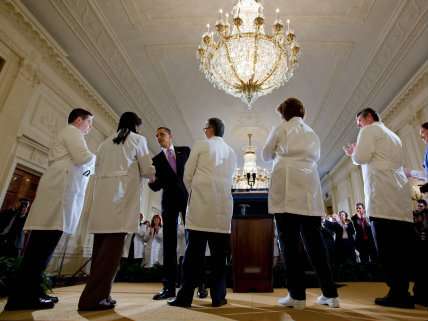In Survey, 46 Percent of Doctors Give Low Grades to Obamacare

More than four years after becoming law, Obamacare is getting low marks from many doctors.
In a survey by the Physician's Foundation that was emailed to physicians in the American Medical Association's database, almost half of doctors—46 percent—gave the federal health law a "D" or an "F." Only a quarter of the physicians who responded gave the program an "A" or a "B" grade.
About 20,000 doctors responded to the survey.
Obamacare wasn't the only federal health policy to score poorly with doctors in the survey. About 85 percent said they have implemented an electronic medical records system, but 46 percent say it has "detracted from their efficiency" while only 24 percent say it has made them more efficient. The 2009 stimulus included some $20 billion in incentive funding meant to encourage health providers to install electronic health records systems.
More than a third of the doctors in the survey—38 percent— say they have either limited the number of Medicaid patients they see or stopped seeing Medicaid patients entirely. Medicaid pays significantly lower rates to providers than other types of health coverage.
Half of the physicians who responded said they believe that the implementation of ICD-10, the complex new federally mandated medical coding system, will "cause severe administrative problems in their practices."
A little more than a quarter of doctors in the survey are now involved in coordinate care programs like the Accountable Care Organizations (ACOs) set up under Obamacare, but just 13 percent say they think ACOs will "enhance quality and decrease costs."
Some of this, no doubt, is just health providers not wanting to adjust their ways or give up autonomy. And some of it is the inevitable selection bias you get from an opt-in survey like this. But I suspect that there's more going on here than just doctors grumbling about change. What you see, fairly consistently, in these responses, is not just a lack of enthusiasm or a personal dislike for the way health policy is going, but a belief amongst a lot of doctors that recent policy changes won't work, and a sense that health care providers have been left out of the reform process.
(Via Phil Klein at The Washington Examiner.)
Editor's Note: As of February 29, 2024, commenting privileges on reason.com posts are limited to Reason Plus subscribers. Past commenters are grandfathered in for a temporary period. Subscribe here to preserve your ability to comment. Your Reason Plus subscription also gives you an ad-free version of reason.com, along with full access to the digital edition and archives of Reason magazine. We request that comments be civil and on-topic. We do not moderate or assume any responsibility for comments, which are owned by the readers who post them. Comments do not represent the views of reason.com or Reason Foundation. We reserve the right to delete any comment and ban commenters for any reason at any time. Comments may only be edited within 5 minutes of posting. Report abuses.
Please to post comments


Yeah, but... FREE HEALTHCARE. JOINING THE REST OF THE INDUSTRIALIZED WORLD. MOAR LIKE EUROPE.
So - it's all good.
If we paid for it by cutting our military expenditures to European levels, then not only could the government spend more on healthcare, but all this "boots on the ground" nonsense would become moot. Seems like a win/win for those in charge.
I'd be all for cutting our military spending and NOT mandating a bunch of medical care shit. THAT would be a win win.
Well, that would be a win/win for you and me, but not for those in charge.
Wow that makes a whole lot of sense dude. For sure.
http://www.Ano-Web.tk
Well, 54% like it so, clearly there is a consensus.
1 out of 4 doctors think Obamacare is great.
More than a third of the doctors in the survey?38 percent? say they have either limited the number of Medicaid patients they see or stopped seeing Medicaid patients entirely.
There ought to be a law...
Give it some time.
Kulaks going to kuul.
Dem spin: A majority of doctors give the ACA a passing grade!
C is for "don't audit me, please."
46% of doctors just need an offer they can't refuse
Remember, only 20% of physicians are even members of AMA. This sample of doctors already biases left.
Actually it's considerably less if you only count practicing physicians. The numbers are padded with medical students, residents, and retired physicians who pay token dues to get the free journals.